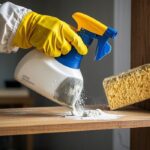If your sewing machine is jammed, skipping stitches, or just isn’t working right, don’t panic. Like any mechanical device, sewing machines sometimes need repair or servicing after extended use. But the big question remains—where can you find a reliable sewing machine repair shop near you?
This guide covers everything you need to know about finding an exemplary sewing machine repair service, from online searches to local recommendations, and when to recognize it’s time to seek professional help. Read on to ensure your trusty machine is back on track quickly.
Signs Your Sewing Machine Needs Repairs
Before starting your search, it’s essential to determine if your sewing machine needs repair or could benefit from a simple cleaning or adjustment. Here are some common signs that indicate it’s time to take your machine to a professional repair shop:

- Skipping Stitches: If threads don’t align in perfect stitches, it might be due to a misalignment in the tension or sewing machine timing.
- Excessive Noise: Loud, grinding, or squeaking noises can indicate internal wear or debris buildup.
- Thread or Needle Issues: Frequent thread jams or broken needles often signal an issue with tension or bobbin alignment.
- Irregular Feed Movement: Are the feed dogs not grabbing the fabric correctly? The mechanism may need calibration or repair.
- Power Problems: If your sewing machine doesn’t turn on or loses power intermittently, it could have an electrical issue.
If one or more of these issues apply, it’s likely time to find a sewing machine repair shop.
Where to Search for a Sewing Machine Repair Shop
Finding a reliable repair service may seem daunting, but it’s easier than you think—especially with these strategies to guide your search.
1. Search Online Reviews and Directories

The internet is invaluable for locating repair services in your area. Websites like Google Maps, Yelp, or specialized directories offer business information and customer reviews to help you make informed decisions.
- Search Key Terms: Use search terms like “sewing machine repair near me,” “sewing machine service,” or “sewing machine technician.”
- Read Reviews: Check out unbiased reviews on platforms like Yelp or Google to learn about other customers’ experiences.
- Look for Specialized Shops: Many sewing machine brands—like Brother, Singer, or Janome—offer authorized repair centers. Search their websites for dealer locators.
Pro Tip: If you can’t find repair shops in your direct neighborhood, broaden your search radius to nearby towns or cities.
2. Check with Local Sewing or Fabric Stores
Your local fabric or sewing stores can be goldmines for finding repair services. Many have partnerships with repair technicians or offer in-house servicing.
- Ask Store Employees: They can often recommend certified repair shops or share insights about local services.
- Community Boards: Sewing stores frequently have bulletin boards with business cards, flyers, or other helpful resources to connect you with professionals.
- Workshops and Maintenance Plans: Some stores also host sewing machine maintenance workshops to address common issues or refer customers to reputable repair experts.
3. Tap into Sewing Communities
The sewing world is wonderfully communal—and your best recommendations often come from fellow sewing enthusiasts.
- Facebook Groups and Forums: Join online sewing communities where members swap tips and local resources.
- Local Meetups: Attend crafting or sewing groups in your area. Participants usually have their favorite repair professionals to recommend.
- Word of Mouth: Don’t hesitate to ask friends or family members who sew—they might have go-to repair shops!
4. Contact the Sewing Machine Manufacturer
If you own a specific sewing machine brand, it’s often a good idea to seek repair advice from the manufacturer.
- Authorized Repair Centers: Manufacturers like Singer, Brother, and Bernina maintain lists of authorized repair centers on their official websites.
- Warranty Servicing: If your machine is still under warranty, the manufacturer may cover the repair cost or suggest an authorized center nearby.
- Customer Service Options: Many manufacturers offer customer support hotlines or live chats to help troubleshoot minor issues.
5. Visit All-in-One Repair Shops
Not all sewing machine shops focus solely on sewing equipment. Broaden your perspective on general repair services.
- Electronic Repair Shops: Some sewing machines have digital components that electricians or electronics repair specialists might handle.
- Vacuum and Sewing Shops: Many shops repair vacuum cleaners and sewing machines—yes, it’s a thing! Search for combined services in your area.
- Fix-It Clinics: Community-driven “Fix-It Clinics” sometimes offer free repair workshops. Attendees can help assess or fix sewing machine issues.
6. Attend Sewing Machine Events or Expos
Repair and industry professionals often showcase their expertise at sewing expos or trade shows.
- Demonstrations: Experts often fix machines live to showcase techniques—some even give consultations.
- Service Booths: Look for booths offering on-the-spot calibration or minor repairs during the event.
- Networking Opportunities: These events also connect you to reliable professionals in the sewing industry.
What to Look for in a Sewing Machine Repair Shop
It’s crucial to vet repair shops carefully to ensure you receive quality service. Before entrusting your sewing machine to a technician, keep these considerations in mind.
- Experience Counts: Look for technicians specializing in sewing machine repair and with years of expertise under their belts.
- Certifications: Some technicians have training from sewing machine manufacturers, making them more qualified for specific brands or models.
- Warranty: Check if the shop offers warranties on their repair services.
- Turnaround Time: Ask how quickly they can complete repairs, mainly if you rely on your sewing machine for work.
- Transparent Pricing: Request a detailed estimate upfront to avoid surprise costs later.
Preventative Maintenance Tips to Extend Your Sewing Machine’s Life
Once your sewing machine is up and running, preventive maintenance can help reduce the need for frequent repairs. Here’s how you can keep your machine in tip-top shape at home:
- Clean After Every Use: Dust and lint accumulation are common culprits behind machine malfunctions. Frequently clean the bobbin case.
- Oil Moving Parts: If your manual permits, use sewing machine oil on specified parts to keep them running smoothly.
- Replace Needles Often: Dull or damaged needles can harm your fabric and the machine.
- Store in a Safe Space: Keep your machine covered and out of humid environments to avoid rust and debris buildup.
Get Back to Sewing with Confidence
A broken sewing machine doesn’t need to halt your creative projects for long. With some savvy searching and research, you can find a trusted sewing machine repair shop nearby to restore your beloved machine to its former glory.
Whether you turn to local fabric stores, online reviews, or manufacturer listings, the proper repair partner will have you back to crafting in no time. And once it’s repaired, don’t forget to maintain it regularly to prolong its lifespan.
Happy sewing!











